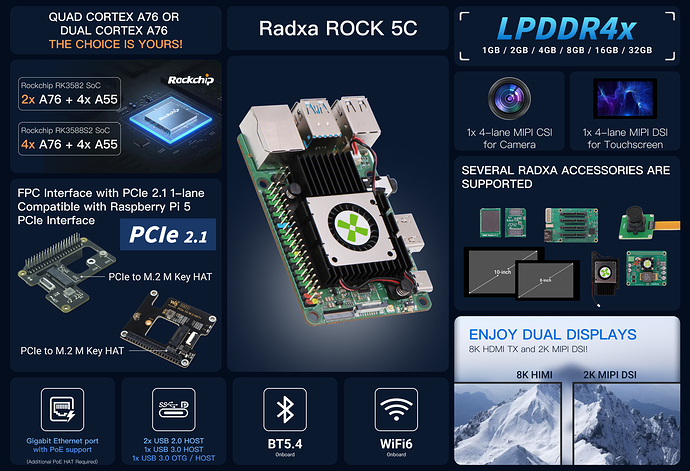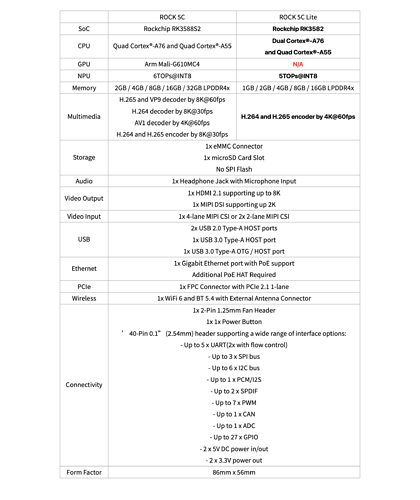Dear Community,
We are excited to announce the launch of the ROCK 5C and ROCK 5C Lite, groundbreaking additions to the world of single board computers (SBCs). These boards bring the high-end ARM Cortex-A76 architecture into the $35 SBC market, offering unprecedented performance and features at an unparalleled price point.
Introducing the ROCK 5C: A New Standard in SBC Performance
The ROCK 5C is engineered to push the boundaries of what an affordable SBC can achieve. Powered by the high-performance Rockchip RK3588S2 SoC, it offers a robust computing experience that rivals desktop performance. The ROCK 5C is not just about raw power; it also introduces a wealth of connectivity and multimedia capabilities:
-
Rockchip RK3588S2 SoC : Features an octa-core processor that integrates ARM Cortex-A76 and Cortex-A55 cores, delivering high-speed and efficient processing.
-
8K HDMI Port : Outputs ultra-high-definition video for the most immersive visual experiences.
-
GbE with PoE Support : Enables fast wired network connections with the added convenience of Power over Ethernet for streamlined installations.
-
MIPI CSI and DSI Interfaces : Support for high-resolution cameras and displays, allowing for dual-camera setups and vibrant screen output.
-
Multiple USB Ports : Includes 2x USB 2.0, 1x USB 3.0 HOST, and 1x USB 3.0 OTG, catering to a wide array of peripherals and devices.
-
Headphone Jack with Mic Support : Provides audio input and output for projects requiring sound integration.
-
eMMC and SD Card Storage : Flexible storage options with an eMMC connector and an SD card slot, ensuring fast and reliable data access.
-
Extensive GPIO : A 40-pin header for interfacing with various sensors, modules, and expansions.
-
Compact Form Factor : All these features are packed into a credit card-sized board that can fit into countless projects.
The ROCK 5C Lite: Streamlined Efficiency at Your Fingertips
The ROCK 5C Lite offers the core features of the ROCK 5C but with a focus on providing essential functions at an even more accessible price. It is powered by the Rockchip RK3582 SoC, which still delivers substantial performance for a wide range of applications:
-
Rockchip RK3582 SoC : Provides a balance of performance and efficiency, making it suitable for server tasks, AI projects, and educational use.
-
Essential Multimedia Support : While streamlined, the ROCK 5C Lite maintains the 8K HDMI output for impressive visual capabilities.
-
Connectivity Options : Retains the full suite of connectivity features including GbE with PoE, USB ports, and camera/display interfaces.
Transforming the SBC Landscape
The ROCK 5C series is positioned to transform the SBC landscape, offering features that are typically reserved for higher-priced boards. Whether you are a developer, a hobbyist, or an educator, these boards provide a versatile and powerful platform for a multitude of projects:
-
AI and Machine Learning : Leverage the onboard NPU for edge AI processing in a compact and cost-effective package.
-
Multimedia Projects : Create stunning visual displays and media centers with 8K video output.
-
IoT and Smart Home : Utilize the Ethernet connectivity with PoE for reliable and clean installations in smart home applications.
-
Educational Tools : Offer students and researchers a high-performance computing experience for learning and development at an affordable entry point.
Conclusion
With the introduction of the ROCK 5C and ROCK 5C Lite, Radxa is once again leading the charge in the SBC market. These boards exemplify a commitment to making high-performance computing accessible to all, without sacrificing functionality or quality.
Which model do you prefer?
- ROCK 5C Lite 1GB - $29.9
- ROCK 5C Lite 2GB - $34.9
- ROCK 5C Lite 4GB - $44.9
- ROCK 5C Lite 8GB - $64.9
- ROCK 5C Lite 16GB - $104.9
- ROCK 5C 2GB - $49.9
- ROCK 5C 4GB - $59.9
- ROCK 5C 8GB - $79.9
- ROCK 5C 16GB - $119.9
- ROCK 5C 32GB - $199.9
0 voters

